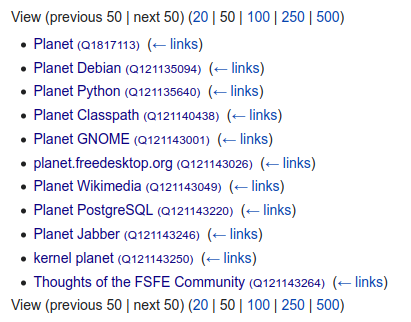-
Boiling points in Wikidata
Some days ago, I started added boiling points to Wikidata, referenced from Basic Laboratory and Industrial Chemicals (wikidata:Q22236188), David R. Lide’s ‘a CRC quick reference handbook’ from 1993 (well, the edition I have). But Wikidata wants pressure (wikidata:P2077) info at which the boiling point (wikidata:P2102) was measured. Rightfully so. But I had not added those yet, because it slows me and can be automated with QuickStatements. -

History, provenance, detail
Just a quick note: I just love the level of detail Wikidata allows us to use. One of the marvels is the practices of named as, which can be used in statements for subject and objects. The notion and importance here is that things are referred to in different ways, and these properties allows us to link the interpretation with the source. For example, Max Born’s seminal work Zur Quantenmechanik (doi:10.1007/BF01328531) uses a very short notation to cite other literature, as footnotes, and DOIs did not exist yet. -

Blog planets: blogging about Debian, GNOME, Wikimedia, FSFE, and many more
I am still an avid user of RSS/Atom feeds. I use Feedly daily, partly because of their easy to use app. My blog is part of Planet RDF, a blog planet. Blog planets aggregate blogs from many people around a certain topic. It’s like a forum, but open, free, community driven. It’s exactly what the web should be. -

Archiving and updating my blog
This blog is almost 18 years old now. I have long wanted to migrate it to a version control system and at the same time have more control over things. Markdown would be awesome. In the past year, I learned a lot about the power of Jekyll and needed to get more experienced with it to use it for more databases, like we now do for WikiPathways. -
Universities and open infrastructures
The role of a university is manifold. Being a place where people can find knowledge and the track record how that knowledge was reached is often seen as part of that. Over the past decades universities outsources this role, for example to publishers. This is seeing a lot of discussion and I am happy to see that the Dutch Universities are taking back control fast now. For example, Radboud University (>1k followers) already joined the Fediverse (Mastodon etc), making them independent from non-EU law and commercial interests. Scientific journals, Nobel Prize winners, etc already joined too , btw. -
Journal Rankings
I am pleased to learn that the Dutch Universities start looking at rankings of a more scientific way. It is long overdue that we take scientific peer review of the indicators used in those rankings seriously, instead of hiding beyond fud around the decline of quality of research. -

Qeios, an open dissemination platform for research output
A bit over a year ago I got introduced to Qeios when I was asked to review an article by Michie, West, and Hasting: “Creating ontological definitions for use in science” (doi:10.32388/YGIF9B.2). I wrote up my thoughts after reading the paper, and the review was posted openly online and got a DOI. Not the first platform to do this (think F1000), but it is always nice to see some publishers taking publishing seriously. Since then, I reviewed two more papers.